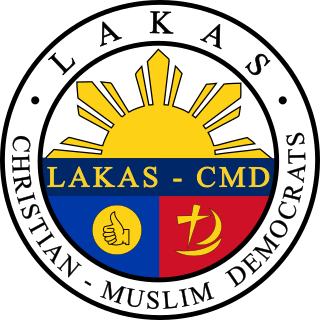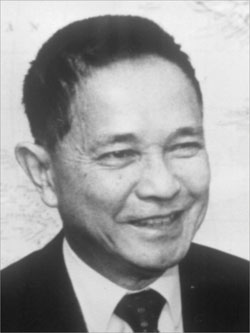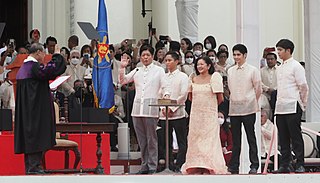Related Research Articles

The Senate of the Philippines is the upper house of Congress of the bicameral legislature of the Philippines with the House of Representatives as the lower house. The Senate is composed of 24 senators who are elected at-large under plurality-at-large voting.

Ramon del Fierro Magsaysay Sr. was a Filipino statesman who served as the seventh president of the Philippines, from December 30, 1953, until his death in an aircraft disaster on March 17, 1957. An automobile mechanic by profession, Magsaysay was appointed military governor of Zambales after his outstanding service as a guerrilla leader during the Pacific War. He then served two terms as Liberal Party congressman for Zambales's at-large district before being appointed Secretary of National Defense by President Elpidio Quirino. He was elected president under the banner of the Nacionalista Party. He was the youngest to be elected as president, and second youngest to be president . He was the first Philippine president born in the 20th century and the first to be born after the Spanish colonial era.

Lakas–Christian Muslim Democrats, abbreviated as Lakas–CMD and popularly known as Lakas, was a political party in the Philippines. Its ideology and that of its successor is heavily influenced by Christian and Islamic democracy. The party's influence on Philippine society is very strong, especially after the People Power Revolution, which has led the country to elect two presidents from the party, namely Fidel V. Ramos, a United Methodist, and Gloria Macapagal Arroyo, a Roman Catholic.

Elpidio Rivera Quirino was a Filipino lawyer and politician who served as the 6th president of the Philippines from 1948 to 1953.

Carlos Peña Romulo Sr. was a Filipino diplomat, statesman, soldier, journalist and author. He was a reporter at the age of 16, a newspaper editor by 20, and a publisher at 32. He was a co-founder of the Boy Scouts of the Philippines, a general in the US Army and the Philippine Army, university president, and president of the United Nations General Assembly.

The Liberal Party, abbreviated as the LP, is a liberal political party in the Philippines.
The Progressive Party of the Philippines (PPP), also known as the Party for Philippine Progress, was a reformist political party that existed in the late 1950s and the 1960s. It is considered to be the earliest Filipino form of a genuine alternative party to the then-dominant political pair of the Nacionalista Party and the Liberal Party. The party ceased to exist by 1969.

Raul Sevilla Manglapus was a prominent post–World War II Filipino politician and songwriter. He co-founded the reformist Progressive Party of the Philippines and the Christian Democratic Socialist Movement in 1968.

DZRJRadyo Bandido is a radio station owned and operated by Rajah Broadcasting Network through its licensee Free Air Broadcasting Network, Inc. Its studio is located at the 2nd Floor, Ventures Building 1, General Luna St. cor. Makati Ave., Poblacion, Makati, while its transmitter is located along KM 21, Quirino Highway, Brgy. Pasong Putik, Novaliches, Quezon City.

Eva Estrada Kalaw was a Filipina politician who served as a senator in the Senate of the Philippines from 1965 to 1972 during the presidency of Ferdinand Marcos. She was one of the key opposition figures against Marcos' 20-year authoritarian rule and was instrumental in his downfall during the People Power Revolution. As a senator, she wrote several laws relating to education in the Philippines, such as the salary standardization for public school personnel, the Magna Carta for Private Schools, the Magna Carta for Students, and an act to institute a charter for Barrio High Schools. She was also among the Liberal Party candidates injured during the Plaza Miranda bombing on August 21, 1971.

This article covers the history of the Philippines from the recognition of independence in 1946 to the end of the presidency of Diosdado Macapagal that covered much of the Third Republic of the Philippines, which ended on January 17, 1973, with the ratification of the 1973 Constitution of the Republic of the Philippines.

José Yulo Yulo was the Chief Justice of the Supreme Court of the Philippines during the Japanese Occupation and was Speaker of the National Assembly of the Philippines from 1939 until World War II started in 1941. Yulo served in all of the branches of government: the legislative as House Speaker, congressman, and senator; the executive as Secretary of Justice and member of the Cabinet; and the judiciary as the Associate Justice and Chief Justice of the Supreme Court of the Philippines. He and his family also owned the Canlubang Sugar Estate that they bought in 1948.

The inauguration of the president of the Republic of the Philippines is a ceremony marking the commencement of the six-year term of a president of the Philippines, who is both head of state and head of government. The inauguration is performed on June 30, as mandated by the 1987 Constitution. Under the older 1935 Constitution, the date was December 30, which is also Rizal Day; the last inauguration held on the older date was Ferdinand Marcos' second one on December 30, 1969. The most recent public presidential inauguration ceremony was that of President Bongbong Marcos, who began his six-year term in office on Thursday, June 30, 2022.

Francisco "Soc" Aldana Rodrigo was a Filipino playwright, lawyer, broadcaster, and a Senator of the Philippines from 1955 to 1967.
Rosita dela Vega, whose real name was Rosario, was born in 1925 and was known as the Queen of the Philippine Novelty Songs of the 1950s, which was considered the golden era of Philippine recording and airwaves.

The 1957 Philippine presidential and vice presidential elections were held on November 12, 1957. Incumbent President and Vice President to Ramon Magsaysay, Carlos P. Garcia was elected for a full term as President of the Philippines. Garcia assumed the post following the death of Magsaysay in a plane crash earlier that year. His running mate, Speaker Jose Laurel Jr., lost to Pampanga Representative Diosdado Macapagal. This was the first time in Philippine electoral history wherein a president was elected by a plurality rather than a majority, and in which the winning presidential and vice presidential candidates came from different parties.

The 1953 Philippine presidential and vice presidential elections were held on November 10, 1953. Former Defense Secretary Ramon Magsaysay was elected President of the Philippines, defeating Incumbent Elpidio Quirino in his run for a second full term. His running mate Senator Carlos P. Garcia defeated Quirino's running mate Senator José Yulo. Incumbent Vice President Fernando Lopez did not run for re-election. With Magsaysay's election as president, he became the first elected president that did not come from the Senate.
Presidential, legislative and local elections were held on November 10, 1953 in the Philippines. Incumbent President Elpidio Quirino lost his opportunity to get a second full term as President of the Philippines to former Defense Secretary Ramon Magsaysay. His running mate, Senator Jose Yulo lost to Senator Carlos P. Garcia. Vice President Fernando Lopez did not run for re-election. This was the first time that an elected president did not come from the Senate. This election also saw the involvement of the United States with the Central Intelligence Agency (CIA) with agent Edward Lansdale running Magsaysay's campaign. Other candidates competed for CIA support too and many normal Filipinos were interested in what the United States citizens views were on it.

Manuel Perez Manahan was a Filipino politician, journalist, businessman, and rural development advocate. He was a key government official during the administration of president Ramon Magsaysay, best known for his stint as the head of the Presidential Complaints and Action Commission. Together with Raul Manglapus, he co-founded the Progressive Party of the Philippines and served as its presidential candidate in 1957. He also served as Senator of the Philippines from 1961 until 1967.
1953 in the Philippines details events of note that happened in the Philippines in the year 1953
References
- 1 2 3 4 Malasig, Jeline (10 February 2022). "The 'Mambo Magsaysay': A look at first campaign jingle used for presidential polls". Interaksyon. Retrieved 29 July 2023.
- ↑ Caparas, George (9 May 2004). "Songs in the key of politics" . Retrieved 29 July 2023.
- ↑ "Mambo, Magsaysay and election campaign tunes". Filipinas Heritage Library. Ayala Foundation, Inc. Retrieved 29 July 2023.